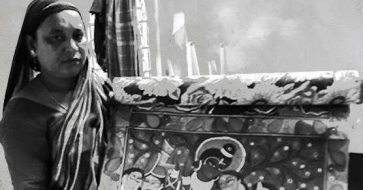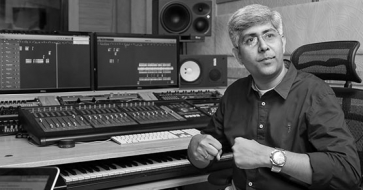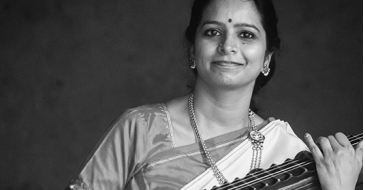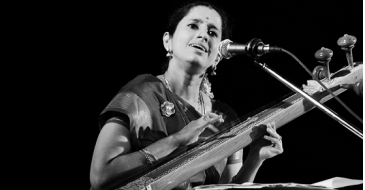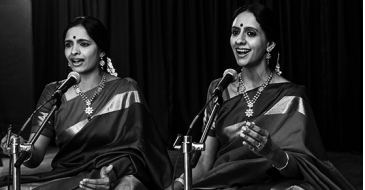Carnatic music seems like an exhaustive encyclopaedia. Is there more to be created?
Carnatic music is a vast ocean. The body of work created by the great practitioners of this art form is like an ocean within this ocean. It serves as the perfect reference point for us, and provides us the required clarity when we are faced with any questions or doubts. We must never forget this throughout our musical journey. For me, personally, it is a big boon to be able to access their work, listen to it and get inspired.
Constructive and smart usage of this treasure - handed over to us by these masters - is very important for this art form. I am sometimes reminded of how difficult it would have been during the times of my grandfather and his peers without such resources at their disposal.
Whatever the yesteryear legends have created in those times is simply mind-boggling. I feel a majority of what we do today is discovering and exploring whatever has been already created by them.
As the grandson of the legendary Palghat Sri Raghu, what would you describe as the "Raghu effect" on you?
It is indeed one of my greatest blessings that I was born as the grandson of Padma Shri Palghat Raghu and could spend more than 20 years living with him.
The "Raghu effect", if I may say, is one that has a great intensity, an unrelenting sense of involvement in any action, in-depth analysis of anything right to the very core, and effective application of one's skill and knowledge.
Creativity is the perspective of the onlooker and may not really matter to the practitioner. While singing, I do not consciously think if I have done something creative. I just keep singing
What is special to you about the music created by Sri Raghu and by your grand uncle Lalgudi Sri G Jayaraman?
They were "Naadayogis". The landscape of Carnatic music they created on their respective instruments was the most beautiful thing I have ever witnessed in my life. They were like water, turning themselves into the shape of the lead musician they accompanied, thereby creating blissful music in unison.
If you have to name one great master of Carnatic music in recent times whose music has impacted you the most, who would that be?
Sri U Srinivas, undoubtedly. I was privileged to attend many of his live concerts. His music impacted me every single time I listened to it. It had something godly about it. Something inexplicably disturbing and reverberating. Even the strum of a single note had so much life in it. He shared a special relationship with my grandfather, Palghat Sri Raghu. They used to enjoy making music together on stage.
Listen to Abhishek Raghuram perform Alayum Maname
When did you discover the joy of creating?
I was exposed to and used to listen to a lot of Carnatic music even as a toddler. I used to try and imitate whatever the great masters sang. Simply by way of listening to a lot of music, I was not only able to sing the compositions but also try improvising.
Everyone seems to be so curious about your creativity. Is it spontaneous or is it something you have worked on consciously?
Personally, I am not aware when creation happens and what we can label as creativity. Creativity is the perspective of the onlooker and may not really matter to the practitioner. While singing, I do not consciously think if I have done something creative. I just keep singing.
This music gives you the room for both spontaneous as well as meticulously planned creations!
Is being creative almost a part of your personality?
It completes every artiste’s personality
What inspires you to create?
Any creation is born out of inspiration. This inspiration can be anything. It can be any music I have listened to. The inspiration for a korvai (rhythmic composition) could be a film song.
The key here is to have a strong capability to listen. Listening in the true sense of the word... It is important to listen with an open mind, without any prejudice. You must not let any bias stemming from your upbringing, culture, moral code of conduct or anything else, come in the way of your listening. It is only then that you will allow yourself to get inspired.
Only when you allow yourself to be inspired will the art inside you grow.
Can you please take us through your creative process? How do you go about it? What is going on in your mind while you are at it?
Practice the art form and creativity will happen as a by-product.
Many great masters have spoken about practicing Carnatic music. At different stages, we may practice with specific goals in our mind like becoming stronger in the fundamentals, learning a new song, presenting a concert well, exploring certain challenging areas, and so on. But beyond all this, I feel it is important to practice the art form for the sheer joy it gives.
It is like penance. Like chanting a mantra repeatedly. There is creativity and joy in practising the same thing over and over again. The art of practising has to evolve and cannot be mechanical.
Since I am a vocalist, my practice focusses on both my voice as well as my music. Understanding your voice and discovering what you can do with it is as satisfying as understanding the music itself.
If the art of practising music is a penance, does it require a certain kind of immersion? Do you get lost in it?
Absolutely. Immersion in the art form is very important. It happens when practicing music becomes second nature. Great masters use the word "siddhi". It can be attained only by immersion. And you do want to get lost in it. Don’t you?
What is it that you get lost in?
Pretty tough to say.
Carnatic music exists both in the realm of sound as well as content. In most cases content seems to be the after taste of sound.
It is important to listen with an open mind, without any prejudice. You must not let any bias stemming from your upbringing, culture, moral code of conduct or anything else, come in the way of your listening. It is only then that you will allow yourself to get inspired
What is your personal takeaway from creating something?
The music itself, its various contours and how it enables me to do many things.
Is there a limit to creativity?
Creativity and limits are opposites. Limiting creativity is an oxymoron.
When do you feel you can actually stop? When do you feel you have a satisfactory version created?
Never. I think what any musician aspires to achieve is to produce the optimal sound possible with the apparatus they have. As a musician you never reach an optimum.
What about creativity when you compose music?
Let us analyse what composing is. Don’t you think it is the counterpunch of all that you have assimilated or have been influenced by, till that moment? So where is the creation really taking place? During the assimilation or during the composing?
What makes a composition creative?
The sound - the most basic thing.
If I am composing a korvai, it must be good to listen to while singing or while playing on an instrument. A pallavi I compose could be complex; but it is of no use if it is not good to hear. However, what must not end up happening is one composing only simple things because they are pleasant to hear. What one composes can be complicated but good to hear as well. That is where the beauty lies. Great compositions are like that.

How do you plan for your performances? What goes into the song selection?
Generally, I do not plan much in advance for my concerts. In most cases, my song selection for a concert depends on factors like the condition of my voice on that day, the acoustics of the venue I am performing in and the composition of my team on-stage.
I generally like to sing throughout the day, whether I have a concert or not. What I practice may not be specific to what I plan to sing in a concert.
Will singing so much in a day not strain your voice?
It is an occupational hazard. If you sing, you will strain your voice.
To sing well, your mind should be relaxed and at peace. You need to manage your voice well. For example, the moment you know your voice is getting strained at some place, you have to introspect, take care and make the necessary changes. Else, your voice can get damaged. The awareness of how my voice is reacting to what I do is very important.
What does a day in Abhishek Raghuram's life look like?
Each day is very different.
The most satisfactory day is when I get to sing endlessly and not do anything else, taking only the mandatory breaks, say for eating and sleeping.
The worst are the days when I have to talk a lot. Talking is really bad for a singer's voice and strains it a lot. Messaging facilities make life easier sometimes.
What about the world outside fascinates you?
The fact that it can survive without my music!
Is music always on your mind?
No. But when music is on my mind, nothing else is.
Interviewed by R Ramkumar
0 comments Comments






